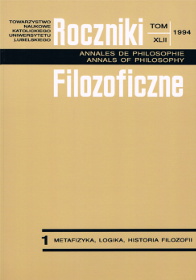A New Shape of the Realism Debate
Abstract
The paper presents the approach to the realism debate, and arguments for anti-realism, propounded in analytical philosophy by Michael Dummett. It describes his metaphilosophical program concerning this debate, two rival theories of meaning (truth-conditional and justificationist), as well as the main lines of development and criticism of his views (as found in the writings of C. Wright, P.F. Strawson, and J. McDowell). The concluding section discusses the relation of Dummettian anti-realism to later Wittgenstein and logical positivism, as well as to the form of anti-realism proposed by H. Putnam. It also considers the broader question whether anti-realism is a form of idealism. Dummett and Wright stress that there are some essential differences between their anti-realism and idealism in its traditional forms. But it is hard to defend that position if one takes into account the anti-realist statements to the effect that objects spring into being in response to our probing, or that there exist gaps and indeterminacies in the world. The paper ends with the suggestion that one of the main reasons which has motivated Dummett in formulating and defending his approach to the realism debate is the belief − widely held by philosophers − that there is no neutral ground on which to resolve metaphysical questions. One has rather to look for consequences of metaphysical views in the areas where (relatively) neutral evidence exists. Dummett believes that kind of evidence can be found in facts about language use and has tried to construct a theory of meaning which would be able to resolve at least some metaphysical issues. But the discussions and controversies surrounding the proper shape and content of the theory of meaning show that it is rather a difficult (if not an impossible) task to achieve.
Copyright (c) 1994 Roczniki Filozoficzne

This work is licensed under a Creative Commons Attribution-NonCommercial-NoDerivatives 4.0 International License.





